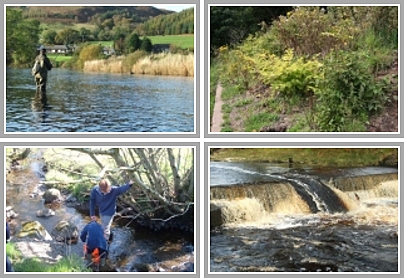Today, Scottish Government announced a U Turn in their reform plans. They may not describe it as a U Turn but that’s how it appears. Read the latest in their press release by following this link http://news.gov.scot/news/wild-fisheries
Their plans to abolish long established District Salmon Fishery Boards appear to have been abandoned. Their unpopular option to fund the changes, future management and proposed FMO’s through rod licensing and levies have gone. So too have the FMO’s or at least that’s how it appears.
From the Trust’s perspective, we remained sceptical throughout that the Government could fund their radical reforms and it appears that this issue may have been the greatest stumbling block for their reform policies.
Perhaps when Andrew Thin first started with his review, he could have taken cognisance of the concerns raised by so many Boards and Trusts that questioned how any of the many reforms could be funded. Perhaps he did but Scottish Government pressed ahead regardless with radical plans to abolish Boards and make redundant the countless volunteers that had freely given their time to run Boards and rivers for years. Half-baked ideas on forming FMO’s appeared without any clarity on what management areas would be involved and no mention on how the necessary funding would be raised. Ultimately it doesn’t appear that there’s any will from the Government to ensure Fishery Management is funded adequately. So Boards will continue as before. Salmon anglers will pay their dues and fund the management of rivers. Other anglers will contribute nothing so inevitably an all species management system was just a distant dream. In reality, this was inevitable, only the Government couldn’t see it.
Tentative suggestions of a rod licence and angling levies soon gathered legs but when faced with the massive opposition from anglers, the Scottish Government suddenly realised they had perhaps bitten off more than they could chew. I don’t think there’s much doubt about that.
Reforms are not necessarily a bad thing, but it doesn’t appear there will be anything worth celebrating as a result of the 3 years of Government meddling. Conservation limits and measures are being hailed as an outcome but come on….lets be honest…. this could have been achieved and possibly in a much more accurate way, with less conflict had the Government first discussed their plans with local interests and in particular Board and Trust biologists around the Country. After all, they have a better understanding of what’s happening locally with our salmon stocks than anyone sitting in Edinburgh, Aberdeen, Pitlochry or Montrose. And of course we can’t ignore the elephant in the room….most of the problems facing salmon stocks in Scottish rivers have little to do with angling and more to do with marine survival. We heard little or nothing of addressing this on the west coast where the greatest problems exist. Anglers and scientists are increasingly concerned about the impact of aquaculture on our smolts but that industry is encouraged to expand while our fish continue to disappear. All I can say is that I hope the Chinese salmon breeding program is as successful as their cheap mass production of everything and anything else. Perhaps then, demand for Scottish/Norwegian Farmed Salmon will collapse.
So finally, after contributing a huge amount of time and resources to the process this Trust will concentrate on our own agendas rather than devoting excessive time to a stuttering reform process. ART and most others Trusts around the country, when faced with such radical overhauls of our industry, engaged extensively with Government departments in an attempt to refine the process. This was at considerable cost to the Trusts and it now seems for little or no apparent benefit. I’m thankful that my employers will continue to be Trustees rather than an FMO board and whoever that may have included.
The ASFB has rebadged themselves and merged with RAFTS members to form Fishery Management Scotland (FMS). I hope that FMS are committed to fighting for its members and interests rather than trying to solve Government problems created entirely by half-baked policy. ART will appreciate going forwards with strong representation within the sector, nae, we will expect it.


A very fair and accurate summary Stuart! This should be ‘required reading’!
The u-turn presents me with a personal problem, as I had always said that I would stand down as dsfb chair once FMOs came into being, now I’ll have to find another line in the sand!
On a more serious note, whilst the continuation of the Conservation Limits regime may have some credence in the corridors of power, it no doubt will continue to cause concerns and angst at river level. Like the vast majority of rivers, the Urr’s anglers by and large are wonderfully supportive of the need to exercise proper restraint, but the imposition of a “status” based at best on pretty flimsy data actually hampers the sterling efforts made over the years, based on education and awareness rather than prescription!
Let us all hope that 2017 will see the start of a return to some degree of sanity, with Boards doing what they should be doing, Trusts beavering away, the sun shining, night time rains to keep levels up, Govt governing rather than politicking……………….
Richard, I agree with your comments on the ‘status’ based approach to conservation. I think it would have been better had all our rivers been given a category 2 status and allowed to rise and fall based on what happens in the years after that. Category 1 implies that all is well and as we know, when something is categorised as the ‘best’ possible, there no room for improvement. When we consider the numbers of salmon we now seen in our rivers compared with 30 – 50 years ago, I think there’s a great deal or room for improvement.
We need commitment from the Boards to carry on doing what they have done for years, improving where their performance and rivers where they can and encouraging a responsible approach from anglers. Boards on the whole act responsibly and have the best interests of the rivers, fish and angling at heart. Of course not all Boards are equal and there may be some merit in a revised set of guidelines being issued by the new FMS organisation to ensure there is clear focus on what and how Boards should operate and how members are appointed. This would be sensible considering it was the Boards that government really wanted to reform. If Boards can put their own houses in order, then there little room or excuse for top down interference. This would also help when holding Government to account for their actions/inactivity.
Where there are no Boards, then we need to see a cohesieve and integrated management system that is empowered by the clubs and respected by anglers. In my opinion, the government should provide support for these management organisations and boards taking a ‘light touch’ approach unless there’s very obviously something wrong in which case they should work with all interests to solve the issues starting with where the root of the problems lie. In the case of wild salmon, that would appear to be influences that are on the whole, external to the rivers. But, sadly I’m not convinced that this lesson has been learned by SG and their departments.